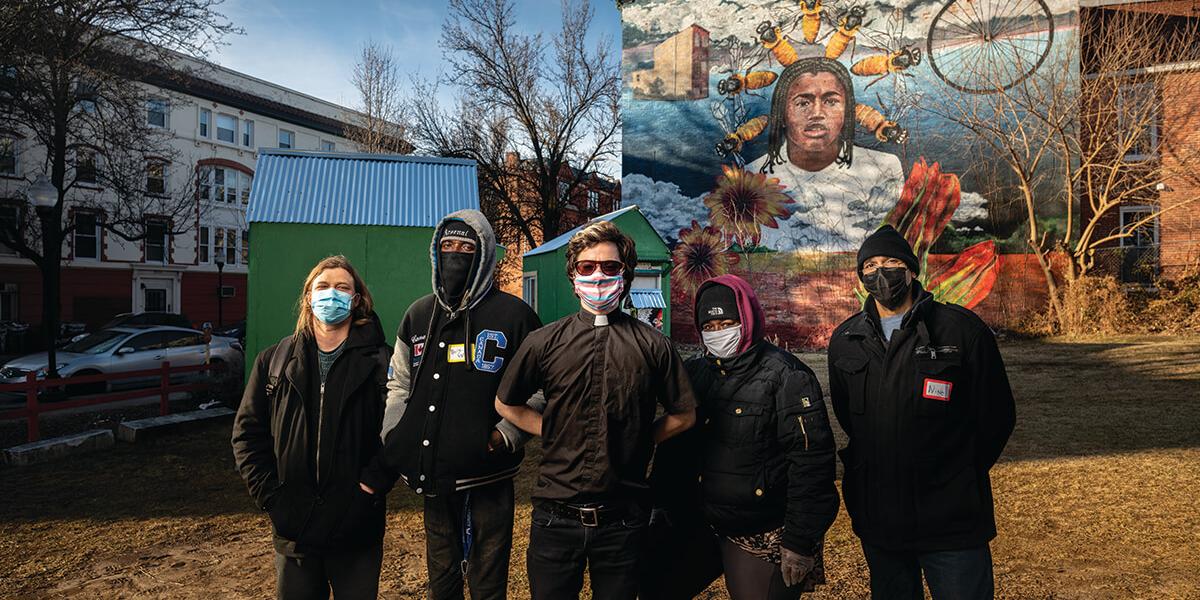News & Community
Red Shed Village Provides Restorative, Transformative Shelter to Those in Need
How a Lutheran ministry brought its neighborhood home.
Pamela used to live on a church portico, exposed to the elements and passersby. But since late January, her lack of housing is no longer an emergency concern. She now has four walls, a roof over her head, and a cat named Patience at Red Shed Village on the 2000 block of St. Paul Street in Charles Village.
“This village really means something to me,” said Pamela, whose last name is being withheld for privacy, during a recent winter gathering shared on social media. “It means a place to live, a place to call home.”
Pamela is one of four residents of Red Shed Village, which is located on a long-held community garden. Last April, four tents were added as a way for unhoused and housing-insecure individuals to shelter during the COVID-19 crisis, which has exacerbated the issue nationwide.
In late January, after several weekends and with the help of some 150 volunteers, those tents were replaced with four eight-by-eight-foot, tiny-home-like structures, insulated and fireproofed, and painted green with tin roofs and locking doors and windows.
It is estimated that, on any given night, more than 2,000 people experience homelessness in Baltimore. The majority are African-American and male. As far as its organizers know, Red Shed Village is the first project of its kind in Baltimore, where several organizations work to address the city’s homelessness.
The village was founded by North Ave Mission, a street ministry in Station North that is part of the Delaware-Maryland Synod of the Evangelical Lutheran Church and noticed a need in the neighborhood. The Mission’s founding pastor, Atticus Zavaletta, pictured center, who is transgender and uses he/they pronouns, says the inclusive ministry is faith expansive.
“Of faith, of different faith, of no faith, it doesn’t matter,” says Zavaletta. “We’re all family.”
He credits a local resident, Anneke “PeeWee” Corbitt, who has since passed away, for connecting him to the community and establishing his credibility—an example of the mutual aid work of North Ave Mission, which Corbett helped co-found.
There are dozens of people involved in the ministry’s various efforts, from hosting weekly community gatherings to being a part of a dedicated “care team” that assists with life in the village.
There are also volunteers, like Daphne Green, 61, a North Ave Mission member and neighborhood resident who helped out during one of the ministry’s recent weekly free markets, welcoming folks and forming lines for the distribution of food and clothing.
“It feels good,” Green says. “People still care.”
When City Councilman Zeke Cohen visited Red Shed Village in September, he felt a strong sense of community and purpose, praising the group for its harm-reductionist approach.
“I learned, even in that brief visit, about the resilience of our city, and what happens when people organize and take control of their own situation,” says Cohen, who thinks there could eventually be space for city government to assist Red Shed Village, along with similar projects, be it financially or logistically, such as providing permits.
Zavaletta sees the village as restorative, transformative shelter. Since it was founded, several residents have moved on to more secure housing, transitioned to treatment facilities, and gained both part-time and full-time employment.
Sharonda Nutt is a founder and former resident of Red Shed Village who remains active with North Ave Mission after recently moving into her own home, considering it a place she can always turn to for community.
“This is a place where you can be yourself,” said Nutt during that winter gathering. “It can be a safe haven…I can go somewhere and be comfortable with who I am.”
